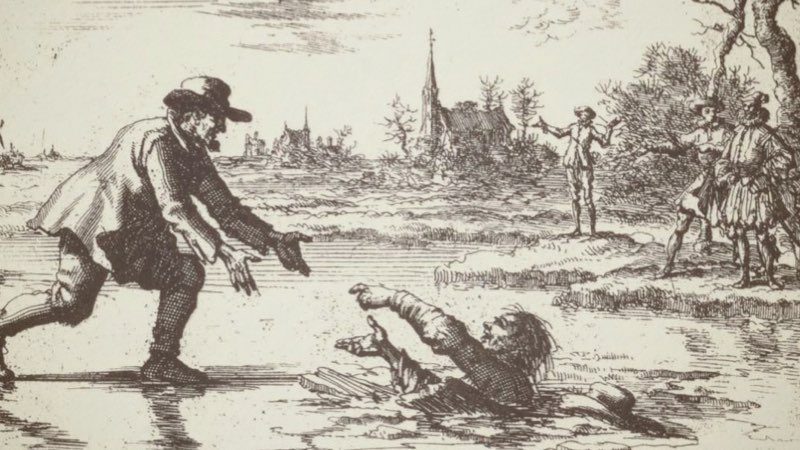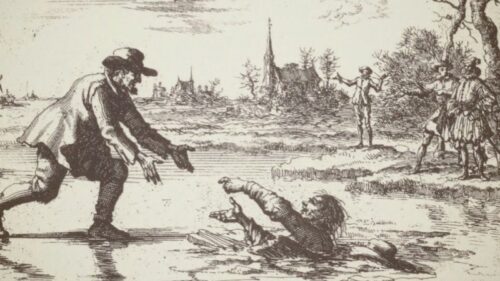
5. Of the Church’s Obscurity
The Church of God Obscured and Rendered Almost Invisible in Some Place; and What has been the Cause of it from Ancient Times
As the moon, notwithstanding her substance and body never perish, is not always seen in her full light by the human eye, either, because she sinks beneath the horizon, or, being too close to the sun, is obscured by him, or, being far from the sun, is darkened by the shadow of the earth, which is called an eclipse; even so it is with the substance and appearance of the church of God on earth. The latter, though never perishing entirely, does not always show herself in her full form, yea, at times she seems to have vanished altogether, yet not in all, but only in some places, either through the slothfulness of some people, who, from want of regard, or for some other reason, neglect the external, manifest commandments of God, or on account of some misconceptions or errors that have arisen, and whereby sometimes many of the true believers have been perverted, and seduced from the true worship of God; or in consequence of persecution, violence and tyranny, exercised against the faith and the practice of it, on account of which the pious are compelled to hide and, as outcasts from mankind, seclude themselves in forests, wildernesses, and solitary places; so that its characteristics, light and virtue could not be seen, much less known, by the common world.
When the church of God of the Old Testament was in Egypt, it could not observe its divine worship, but had to request permission “to go three days’ journey into the wilderness, and sacrifice to the Lord.” Ex. 8:26, 27, compared with Ex. 10:26.
During the forty years that this same people was in the wilderness, such remarkable events happened that all their children remained uncircumcised, not receiving circumcision until they had become old, and arrived in the land of Canaan, at mount Aralot. Josh. 5:2-8.
In the time of Elijah this church was so greatly obscured on account of persecution, that he thought that lie alone was left, though God had reserved to Himself seven thousand persons who served Him, and had not bowed their knees to Baal. I Kings 19:14, 18; Rom. 11:3, 4.
When this people had been carried away into Babylon, the house of God, at Jerusalem, where divine worship was wont to be made, lay waste, and the stones of the sanctuary were scattered in all the streets; yea, among the people in Babylon, matters were in so bad a condition, in regard to religion and the songs of praise with which they were wont to worship God, that they had hung their harps on the willows that were planted there by the rivers, Ps. 137:1-4; for which reason they were numbered among the dead and among those that go down to the grave. Bar. 3:10-14.
After the Babylonian captivity, in the time of the Maccabees, many of the church of Israel, be- cause of the existing danger, hid themselves in caves, in order that they might keep the Sabbath. II Mace. 6:11.
All these obscurations, like sad eclipses in the divine worship, have happened in the church of God of the Old Testament, before the birth and advent of Christ into this world; and much more might be said in regard to this, if it were necessary, but we consider it sufficient to have made simple mention of it from time to time.
The same took place also after the advent of Christ in the church under the Gospel, which was composed of Jews and Gentiles; she too, could not always raise her head with safety, but was oft- times, like the sun behind clouds, concealed from the common sight of men.
Even in the time when Christ dwelt bodily among men, and had risen from the dead, His disciples, the chief members of His church, sat concealed, with closed doors, for fear of the Jews. John 20:19.
After the ascension of Christ, the very numerous church which was at Jerusalem, dispersed, on account of persecution, through the land of Judea and Samaria, except the apostles; so that this distinguished church, which, it appears, was the chief one on the face of the earth, had to sojourn secretly in a strange land. Acts 8:1.
Afterwards, when the emperor Domitian had banished John, the holy apostle and evangelist, for the Gospel’s sake, to the island of Patmos, the Holy Ghost revealed unto him the future state of the church of Christ, namely, that she would have to flee into the wilderness, on account of the persecution of Antichrist, and there be fed by God, a thousand two hundred and threescore days, which, reckoned according to prophetic language, means as many years. Rev. 12:6-11.
Whether we begin to reckon these years from the death of the apostles; or with the year 300, when the so-called patriarchs had their origin; or with the year 600; or a little later, when Mohammed rose in the east among the Greeks, and the pope in the west among the Latins, and raised no small persecution against the defenseless and inno- cent little flock of the church of Christ, so that all who did not wish to be devoured, either in soul or in body, had to hide themselves in deserts and wildernesses; let it be reckoned as it may, say we, a very long period is to be understood by it, which has extended to this, or about this time.
Here the rose has blossomed very gloriously among the thorns. Song of Sol. 2 :2. Here the dove that was in the clefts of the rock and in the secret places of the stairs, let her sweet voice be heard. [In the clefts of the rock and in the secret places of the stairs, that is, in persecutions and in solitary and strange regions; just as “among the thorns” signifies, in the power of evil-minded and bloodthirsty tyrants.] Verse 14. Here the Lord said: “A garden enclosed is my sister, my spouse; a spring shut up, a fountain sealed” (Song of Sol. 4:12). Here the Son of God has fed, sustained and preserved His church against the sentence of worldly and carnal minded men, who, because they are carnal, cannot comprehend the things of the Spirit of God.
But lest any should misconstrue our preceding proposition, let it be understood, that when we speak of the obscuration, concealment, or the becoming invisible, of the church of God, we do not mean the church in general, or in all places, for the church in general has never been obscured and hidden in all places at the same time; but we mean thereby some parts of the church in general, namely, some particular societies, belonging to the body of the general church which is spread over the whole earth.
It must be stated, also, that by the term, general church, we do not understand all the churches which bear the Christian name; but only those who express the Christian name by their upright faith and pure observance of the Christian and Evangelical commandments.
Now the question arises, whether our church of the present day, called the Anabaptists, has truly descended, and derived her succession, from the aforementioned church of God which has existed from the beginning, and kept the commandments of God in purity.
But, in order to do this briefly and in the best manner, we shall leave untouched the time and conditions of the church from Adam to Christ, as being an undisputed point; and only examine the time and condition of the church after the advent of Christ; for the point of difference relates solely to those who and which, by virtue of true succession, have a right to the same.
Thieleman J. Van Braght (1625-1664) was an Anabaptist who is best known for writing a history of the Christian witness throughout the centuries entitled “The Bloody Theater or Martyrs Mirror of the Defenseless Christians who baptized only upon confession of faith, and who suffered and died for the testimony of Jesus, their Saviour, from the time of Christ to the year A.D. 1660” (1660).
Thieleman J. Van Braght, Martyrs Mirror




